Want to know more about the Best Astronomy Schools In the US and make an informed decision? Here is a good place to start.
Are you a starry-eyed dreamer with a passion for the cosmos? Do you spend your nights gazing up at the sky, wondering what secrets lie beyond our little blue planet?
If so, then you might just be cut out for a career in astronomy. But let’s be real, you can’t just point your telescope at the sky and expect to become the next Neil deGrasse Tyson overnight.
You need a top-notch education from one of the best astronomy schools in the world. Lucky for you, we’ve done the research so you don’t have to. So sit back, relax, and get ready to blast off into the world of astronomy education.
Please note that schools are selected based on our criteria (at the end of the article), ranked by the latest acceptance rate.
Table of Contents
#25. University of Illinois at Urbana-Champaign


- Acceptance rate: 60%
- Average entry score: 1210-1470 SAT or 27-33 ACT
- Student-to-faculty ratio: 21 to 1
- Estimated cost of attendance (tuition and fees): $33,060-$50,510
- Average earning potential for graduates: $44,900 (College Simply)
The astronomy programs at the University of Illinois at Urbana-Champaign provide a dynamic environment for students to learn and conduct research.
Students have access to state-of-the-art facilities and are taught by internationally renowned faculty with a wealth of knowledge and expertise.
The department promotes a collaborative and inclusive community where students can work alongside peers and faculty to explore the mysteries of the universe.
These programs also offer unique opportunities for students to gain experience outside of the classroom. The department hosts numerous research conferences and workshops each year, as well as student-led outreach events.
Source: University of Illinois at Urbana-Champaign
#24. University of Wisconsin Madison


- Acceptance rate: 60%
- Average entry score: 1300-1480 SAT or 28-32 ACT
- Student-to-faculty ratio: 18 to 1
- Estimated cost of attendance (tuition and fees): $27,484-$55,372
- Average earning potential for graduates: $57,100 (College Simply)
With professors who are truly out of this world, students are launched into a comprehensive curriculum that covers everything from the Big Bang to black holes.
The program’s facilities are simply astronomical, including the historic Washburn Observatory, which is sure to leave you starry-eyed.
And when it comes to future career prospects, graduates of this program are shooting for the stars with opportunities in academia, industry, and government.
Source: UW-Madison Department of Astronomy
#23. University of Florida

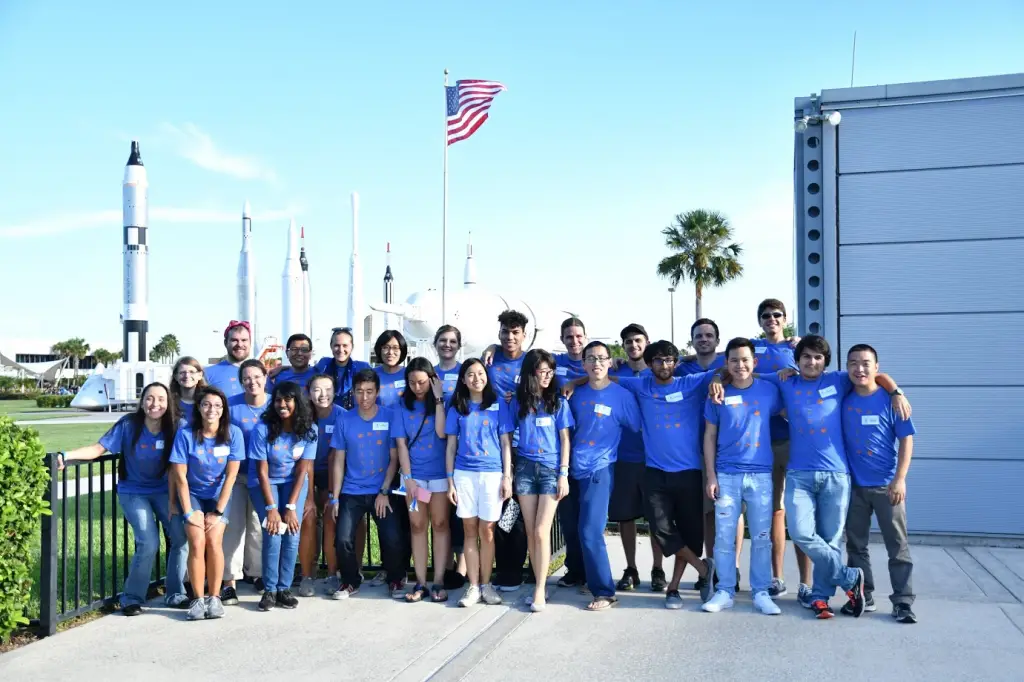
- Acceptance rate: 42%
- Average entry score: 1300-1470 SAT or 29-33 ACT
- Student-to-faculty ratio: 18 to 1
- Estimated cost of attendance (tuition and fees): $21,430-$43,708
- Average earning potential for graduates( Undergraduate): $33,700 (College Simply)
Students prefer the University of Florida’s astronomy programs for several reasons. Firstly, the department boasts world-renowned faculty members who are leaders in their respective fields.
They offer students an exceptional education with opportunities for research and internships. Additionally, the department has state-of-the-art facilities that provide students with hands-on experience and exposure to cutting-edge technology.
The university’s location in Gainesville, Florida also allows for optimal viewing conditions with clear skies year-round. Lastly, the department’s strong sense of community and supportive environment makes it an ideal place for students to pursue their passion for astronomy.
Source: UF Catalog
#22. University of California San Diego


- Acceptance rate: 34%
- Average entry score: 1270-1480 SAT or 28-34 ACT
- Student-to-faculty ratio: 12 to 1
- Estimated cost of attendance (tuition and fees): $36,061-$65,835
- Average earning potential for graduates: $50,000 (College Simply)
At UC San Diego, students have the opportunity to study both astrophysics and astronomy, two closely related fields that explore the mysteries of the universe.
The curriculum is designed to provide students with a comprehensive understanding of these complex disciplines, covering topics such as cosmology, planetary science, and observational techniques.
With state-of-the-art facilities and a renowned faculty, UC San Diego offers students a unique and immersive learning experience in the field of astrophysics and astronomy.
Source: UCSD Astronomy & Astrophysics
Similar articles like this:
- 25 Best Physics Schools In The US
- 25 Best Psychology Schools In The US
- 25 Best Sociology Schools In The US
#21. University of Texas at Austin
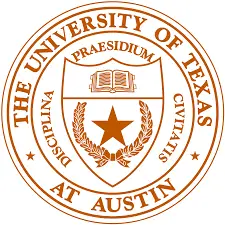

- Acceptance rate: 32%
- Average entry score: 1230-1500 SAT or 29-34 ACT
- Student-to-faculty ratio: 16 to 1
- Estimated cost of attendance (tuition and fees): $28,928-$57,512
- Average earning potential for graduates (Undergraduate): $37,779 (College Simply)
The Department of Astronomy at the University of Texas at Austin offers a range of programs for students interested in studying the cosmos. Undergraduates can pursue a Bachelor of Arts or Bachelor of Science in Astronomy, as well as a minor in Astronomy.
Graduate students can earn a Master’s or Ph.D. in Astronomy, with research areas including planetary systems, star formation, and cosmology.
The school boasts a fairly large student population and is also home to several research centers, including the McDonald Observatory.
Source: UT Austin qDepartment of Astronomy
#20. Case Western Reserve University
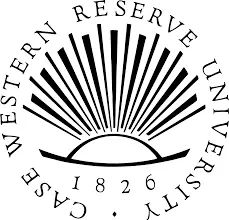

- Acceptance rate: 30%
- Average entry score: 1420-1510 SAT or 32-35 ACT
- Student-to-faculty ratio: 9 to 1
- Estimated cost of attendance (tuition and fees): $62,234
- Average earning potential for graduates: $65,400 (College Simply)
At Case Western Reserve University, aspiring astronomers have the unique opportunity to learn from leading experts in the field and gain hands-on experience with cutting-edge equipment.
The university’s astronomy degree program is widely recognized as one of the best in the world, offering rigorous coursework and research opportunities that prepare graduates for successful careers in academia, industry, and beyond.
With a strong emphasis on interdisciplinary collaboration and innovation, Case Western Reserve is truly a top destination for anyone looking to explore the wonders of the universe and push the boundaries of our understanding of the cosmos.
Source: Case Western Reserve University
What’s it like to study at Case Western Reserve University?
#19. Boston University

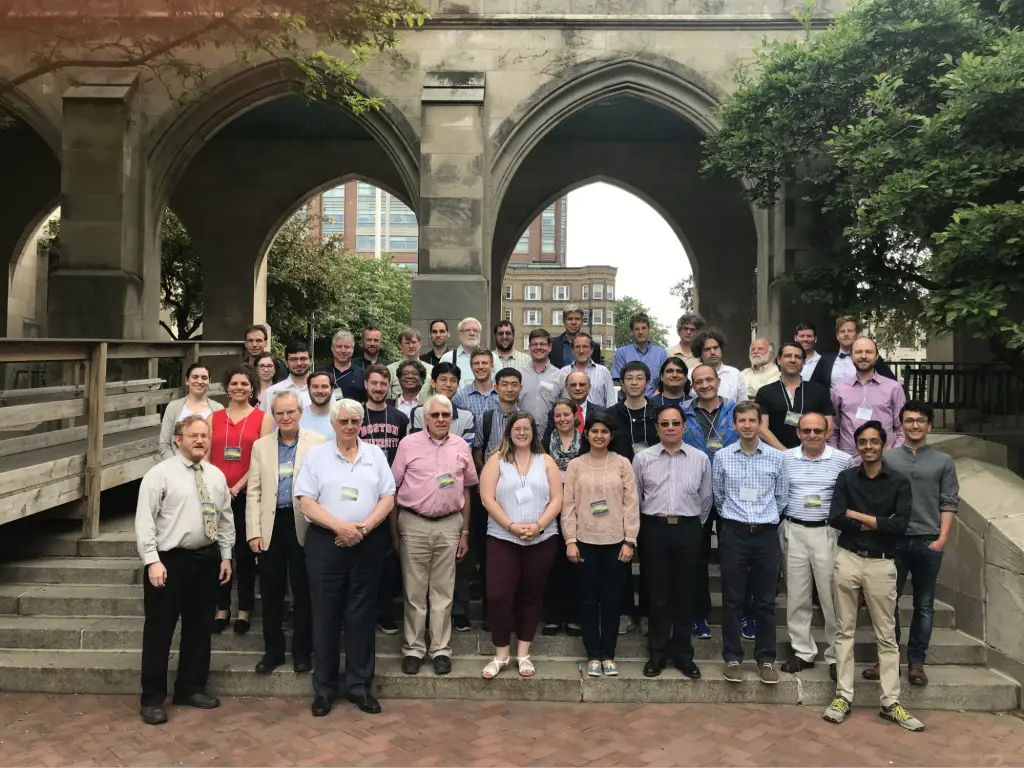
- Acceptance rate: 20%
- Average entry score: 1310-1500 SAT
- Student-to-faculty ratio: 11 to 1
- Estimated cost of attendance (tuition and fees): $79,606
- Average earning potential for graduates: $66,900 (College Simply)
Boston University offers an exceptional program for budding astronomers, with access to state-of-the-art equipment, renowned faculty, and a diverse community of peers.
With a focus on hands-on learning, students have the opportunity to participate in research projects, attend conferences, and engage with leading experts in the field.
The university’s location in the heart of Boston also provides unique opportunities for students to collaborate with nearby institutions and organizations.
Source: Boston University Astronomy
What’s it like to study at Boston University?
#18. University of Virginia


- Acceptance rate: 20%
- Average entry score: 1320-1510 SAT or 30-34 ACT
- Student-to-faculty ratio: 15 to 1
- Estimated cost of attendance (tuition and fees): $36,840-$70,808
- Average earning potential for graduates: $57,560 (Grad Reports)
The University of Virginia’s Department of Astronomy offers a range of undergraduate and graduate programs. Undergraduates have the opportunity to major or minor in astronomy and can participate in research projects with faculty members.
Graduate students can pursue a Ph.D. in astronomy or astrophysics, and have access to cutting-edge research facilities. The department also hosts seminar series featuring talks by visiting researchers and faculty members.
Source: Department of Astronomy
What’s it like to study at the University of Virginia?
Similar articles like this:
- 25 Best Political Science In The US
- 25 Best Social Sciences Schools In The US
- 25 Best Veterinary Schools In The US
#17. University of Michigan Ann Arbor
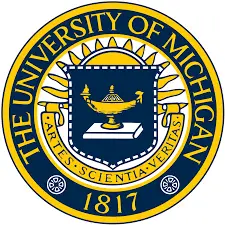

- Acceptance rate: 20%
- Average entry score: 1360-1530 SAT or 31-34 ACT
- Student-to-faculty ratio: 15 to 1
- Estimated cost of attendance (tuition and fees): $32,272-$69,326
- Average earning potential for graduates(undergraduate degree): $19,258 (College Factual)
The University of Michigan boasts a rich history of astronomical research, with a long-standing tradition of cutting-edge discoveries in the field.
From pioneering work on cosmic rays and black holes to groundbreaking observations of distant galaxies and exoplanets, Michigan astronomers have made significant contributions to our understanding of the universe.
The university’s state-of-the-art facilities provide students and researchers with unparalleled resources for exploring the mysteries of the cosmos.
Sources: University of Michigan
What’s it like to study at the University of Michigan Ann Arbor?
#16. University of California Berkeley


- Acceptance rate: 14%
- Average entry score: 1415 SAT
- Student-to-faculty ratio: 17 to 1
- Estimated cost of attendance (tuition and fees): $41,878-$71,632
- Average earning potential for graduates: $35,060 (College Factual)
UC Berkeley’s astronomy programs are out of this world! The department boasts top-notch professors and cutting-edge research. Undergraduates can earn a Bachelor of Arts in Astronomy with hands-on experience in observing the cosmos.
Grad students can pursue a Ph.D. in Astronomy with opportunities to join faculty on groundbreaking projects. Graduates shine brighter than the stars they study, landing careers in academia, industry, and government.
Sources: Berkeley Academic Guide
#15. Carnegie Mellon University
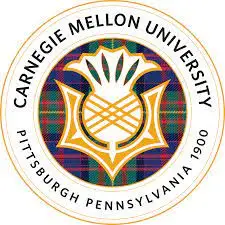
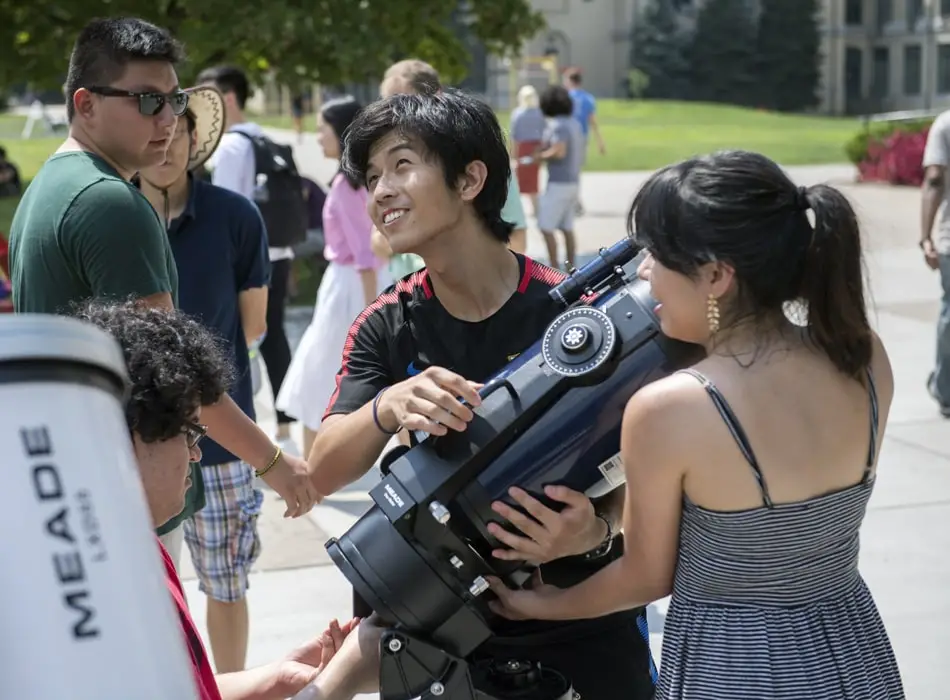
- Acceptance rate: 14%
- Average entry score: 1480-1560 SAT or 33-35 ACT
- Student-to-faculty ratio: 6 to 1
- Estimated cost of attendance (tuition and fees): $77,474
- Average earning potential for graduates: $72,900 (Grad Reports)
Carnegie Mellon University has built a strong reputation in the field of astronomy by bringing together experts in physics, math, and astrophysics to provide top-notch education to their students.
With a focus on cutting-edge research and practical application, the university’s astronomy program emphasizes the importance of interdisciplinary collaboration in solving complex problems in this field.
By providing students with access to world-class facilities and resources, Carnegie Mellon’s astronomy program prepares them for successful careers in academia, research, and industry.
Source: Carnegie Mellon University
What’s it like to study at Carnegie Mellon University?
#14. University of Southern California


- Acceptance rate: 13%
- Average entry score: 1320-1520 SAT or 30-34 ACT
- Student-to-faculty ratio: 9 to 1
- Estimated cost of attendance (tuition and fees): $60,446
- Average earning potential for graduates: $63,000 (College Simply)
As an astronomy student at the University of Southern California, you’ll benefit from a highly conducive learning environment.
With access to top-notch telescopes and research opportunities, you’ll be able to gain hands-on experience and work alongside leading experts in the field.
Additionally, USC’s small class sizes and personalized attention from faculty ensure that you’ll receive individualized support and guidance as you pursue your studies in astronomy.
Source: USC Physics
Similar articles like this:
- 25 Best Information Technology Schools In The US
- 25 Best Zoology Schools In The US
- 25 Best Journalism Schools In The US
#13. Emory University


- Acceptance rate: 13%
- Average entry score: 1420-1540 SAT or 32-34 ACT
- Student-to-faculty ratio: 9 to 1
- Estimated cost of attendance (tuition and fees): $75,594
- Average earning potential for graduates: $63,010 (Grad Reports)
Emory University’s astronomy degree program is a standout among its peers in the United States.
The program’s research-focused curriculum is led by world-renowned faculty members who are experts in the field. Students benefit from hands-on learning experiences, including access to state-of-the-art telescopes and observatories.
The program also offers opportunities for internships and research projects with leading astronomy organizations. Emory’s commitment to providing a comprehensive education in astronomy ensures that graduates are well-prepared for successful careers in the field.
Sources: Emory Physics
What’s it like to study at Emory university?
#12. University of California Los Angeles
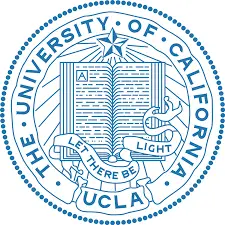

- Acceptance rate: 11%
- Average entry score: 1290-1520 SAT
- Student-to-faculty ratio: 18 to 1
- Estimated cost of attendance (tuition and fees): $16,847-$31,949
- Average earning potential for graduates: $43,900 (College Simply)
The UCLA Division of Astronomy and Astrophysics is a leading research institution dedicated to the study of the universe.
With a focus on both observational and theoretical research, the division is home to renowned faculty and researchers who work on the study of galaxies, stars, and black holes.
The division also operates state-of-the-art observatories and telescopes around the world, providing its members with unparalleled access to the cosmos. Through their research, the division seeks to advance our understanding of the universe and our place within it.
Source: UCLA Division of Astronomy & Astrophysics
#11. Tufts University


- Acceptance rate: 11%
- Average entry score: 1440-1550 SAT or 33-35 ACT
- Student-to-faculty ratio: 9 to 1
- Estimated cost of attendance (tuition and fees): $81,700
- Average earning potential for graduates: $65,600 (College Simply)
Tufts University’s astronomy programs provide students with a strong foundation in the field of astronomy, astrophysics, and space science.
Students are equipped with the skills necessary for conducting cutting-edge research, including theoretical modeling, data analysis, and scientific communication. They have access to state-of-the-art facilities, observatories, and telescopes both on and off campus.
The program also emphasizes interdisciplinary learning, providing students with a well-rounded education that prepares them for a variety of career paths in academia, industry, and government.
Ultimately, students leave the program equipped with the knowledge and skills to make meaningful contributions to the field of astronomy.
Source: Tufts University
What’s it like to study at Tufts University?
#10. Cornell University
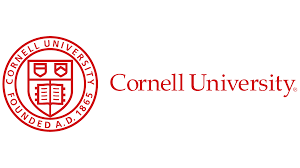

- Acceptance rate: 11%
- Average entry score: 1450-1560 SAT or 33-35 ACT
- Student-to-faculty ratio: 9 to 1
- Estimated cost of attendance (tuition and fees): $78,992
- Average earning potential for graduates: $38,630 (College Factual)
Cornell University is renowned for its world-class programs in astronomy, astrophysics, and planetary sciences.
The Department of Astronomy provides undergraduate and graduate programs that offer students a comprehensive understanding of the universe, from the properties of galaxies and stars to the structure of the universe itself.
Students in the astrophysics program explore cutting-edge research in the field by combining the study of astrophysical phenomena with the principles of physics.
The planetary sciences program prepares students for careers in planetary exploration and research by focusing on the study of planets, moons, and other celestial bodies.
Source: Cornell University
Similar articles like this:
- 25 Best Schools For Soil Sciences In The US
- 25 Best Art History Schools In The US
- 25 Best Schools For Aerospace Engineering In The US
#9. Rice University


- Acceptance rate: 10%
- Average entry score: 1490-1570 SAT or 34-35 ACT
- Student-to-faculty ratio: 6 to 1
- Estimated cost of attendance (tuition and fees): $74,110
- Average earning potential for graduates: $70,500 (College Simply)
Rice University’s Department of Physics and Astronomy provides students with a rigorous curriculum that covers the fundamental principles of physics and the latest developments in the field.
Graduate students have the opportunity to work with world-renowned faculty on cutting-edge research projects in areas such as condensed matter physics, particle physics, and cosmology.
The department also offers numerous opportunities for students to participate in research, including summer research programs and internships at research institutions around the world.
Source: Department of Physics and Astronomy
#8. University of Chicago


- Acceptance rate: 7%
- Average entry score: 1510-1580 SAT or 33-35 ACT
- Student-to-faculty ratio: 5 to 1
- Estimated cost of attendance (tuition and fees): $85,536
- Average earning potential for graduates: $38,300 (College Simply)
The University of Chicago’s Department of Astronomy and Astrophysics is one heck of an astronomical adventure.
These sky explorers are not just staring at the stars, they’re making groundbreaking discoveries through their theoretical and observational work. They’re like the Sherlock Holmes of the cosmos, but with more telescopes and fewer deerstalkers.
From the secrets of dark matter to the mysteries of galaxy formation, they have a unique opportunity to study astrophysics and astronomy.. And with access to top-notch facilities, they’re well-equipped to keep the universe on its toes.
Source: Department of Astronomy and Astrophysics
#7. Brown University


- Acceptance rate: 6%
- Average entry score: 1460-1570 SAT or 33-35 ACT
- Student-to-faculty ratio: 6 to 1
- Estimated cost of attendance (tuition and fees): $84,986
- Average earning potential for graduates: $21,510 (Grad Reports)
At Brown University, astrophysics students takes advantage of the program which delves into the physical processes governing celestial objects like stars, galaxies, and the universe. The program offers classes in theoretical and observational astrophysics.
Meanwhile, the Cosmology program examines the universe’s origin, evolution, and structure. Students can explore topics like dark matter, dark energy, and cosmic microwave background radiation.
Both programs offer exciting opportunities for students passionate about the mysteries of the universe.
Source: Brown University
#6. Dartmouth College


- Acceptance rate: 6%
- Average entry score: 1449-1560 SAT or 32-35 ACT
- Student-to-faculty ratio: 7 to 1
- Estimated cost of attendance (tuition and fees): $81,662
- Average earning potential for graduates: $68,200 (College Simply)
Dartmouth College’s commitment to a tight-knit academic community has been a defining characteristic of the institution for decades. Aspiring astronomers at the college are particularly fortunate, as they have access to some of the most cutting-edge facilities in the world.
From state-of-the-art telescopes to advanced computer labs, Dartmouth offers its students the tools they need to explore the mysteries of the universe. This combination of community and technology creates an inspiring environment that encourages collaboration, innovation, and a passion for discovery.
Source: Dartmouth
Similar articles like this:
- 25 Best Schools For Business Management Studies In The US
- 25 Best Schools For Programming In The US
- 25 Best Commerce Schools In The US
#5. Yale University


- Acceptance rate: 5%
- Average entry score: 33-35 ACT
- Student-to-faculty ratio: 6 to 1
- Estimated cost of attendance (tuition and fees): $84,525
- Average earning potential for graduates: $88,000 (College Dunia)
Yale University’s Astronomy Department is home to renowned scholars and researchers who have made significant contributions to the field.
The school’s state-of-the-art telescopes and observatories provide students with hands-on experience and exposure to cutting-edge technology.
Yale also offers a robust curriculum that covers a wide range of topics in astronomy, ensuring that students receive a comprehensive education. With access to these resources, it’s no surprise that Yale graduates go on to become leaders in the field of astronomy.
Source: Department of Astronomy
#4. Columbia University

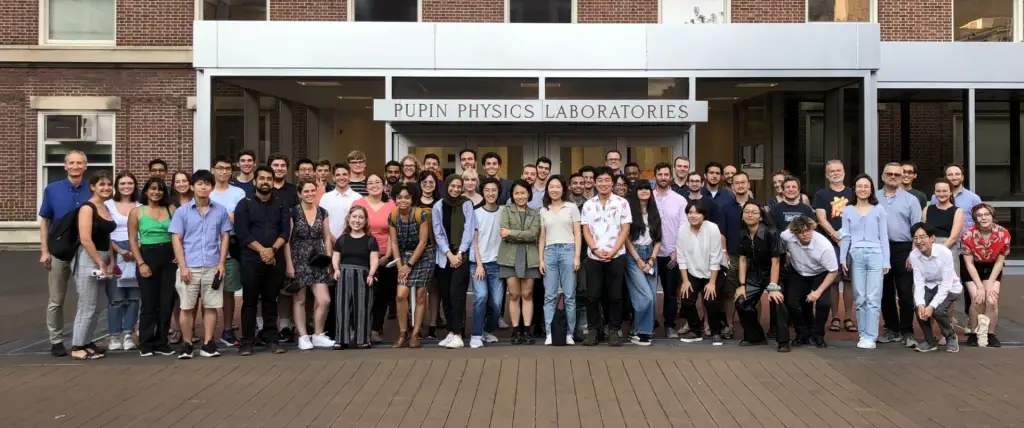
- Acceptance rate: 4%
- Average entry score: 1440-1570 SAT or 34-35 ACT
- Student-to-faculty ratio: 6 to 1
- Estimated cost of attendance (tuition and fees): $85,000
- Average earning potential for graduates: $84,650 (Grad Reports)
Columbia University has a world-renowned department of physics and astrophysics that offers cutting-edge research and education in the fields of astrophysics, cosmology, and physics.
The department boasts a team of expert faculty members who conduct groundbreaking research in areas such as dark matter, black holes, and the origins of the universe.
Students in the program have access to state-of-the-art facilities and resources, as well as opportunities to collaborate with leading researchers in the field.
The program prepares graduates for careers in academia, research, and industry, and is widely regarded as one of the best in the world.
Sources: Columbia University
#3. Princeton University

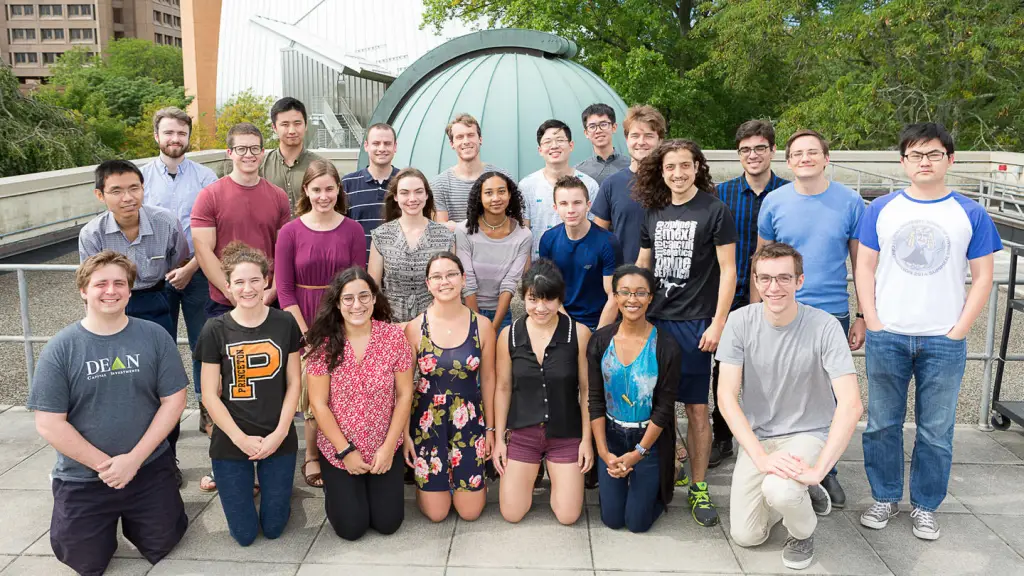
- Acceptance rate: 4%
- Average entry score: 1570 SAT
- Student-to-faculty ratio: 5 to 1
- Estimated cost of attendance (tuition and fees): $78,490
- Average earning potential for graduates: $77,655 (Glassdoor)
Students who study astronomy at Princeton have access to some of the most advanced telescopes and research facilities in the world. The faculty are experts in their fields, with many having made groundbreaking discoveries and contributions to the field of astronomy.
Under their guidance, students gain a thorough understanding of the universe and the tools to conduct their own research. Studying astronomy at Princeton is an unparalleled opportunity to learn from and work alongside the best in the field.
Source: Department of Astrophysical Sciences
#2. Harvard University

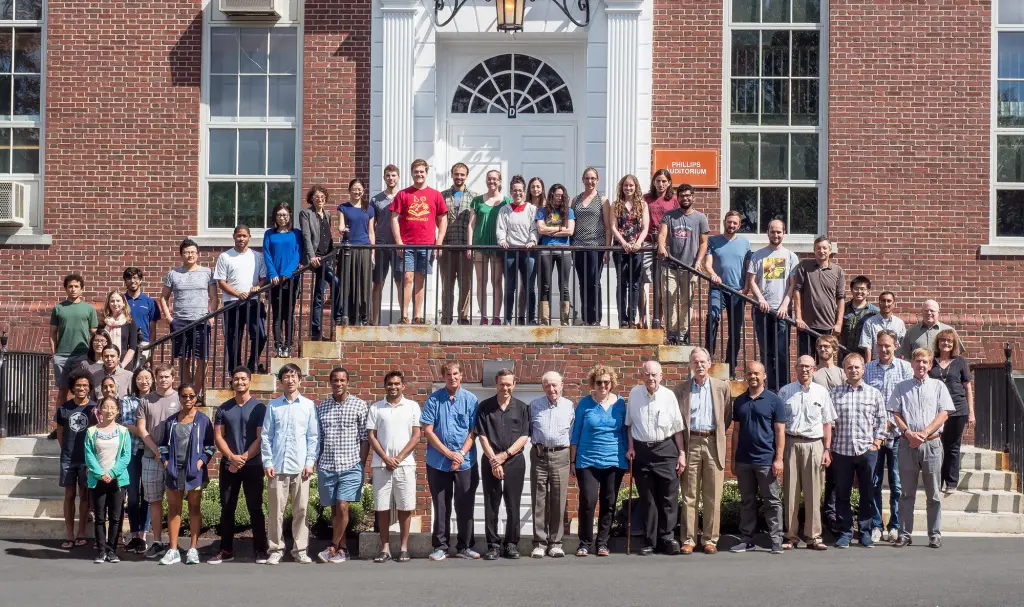
- Acceptance rate: 4%
- Average entry score: 1460-1580 SAT or 33-35 ACT
- Student-to-faculty ratio: 7 to 1
- Estimated cost of attendance (tuition and fees): $76,963
- Average earning potential for graduates: $80,500 (, College Simply)
Harvard University’s astronomy program is one of the oldest and most prestigious in the world. The department’s faculty members are renowned for their research on a wide range of topics, including black holes, galaxy formation, and exoplanets.
The program offers undergraduate and graduate degrees, as well as opportunities for research and collaboration with faculty members. Students enrolled in astronomy and astrophysics programs have access to cutting-edge technology and facilities, including the Harvard-Smithsonian Center for Astrophysics.
The program also hosts regular seminars and events featuring prominent astronomers from around the world.
Source: Department of Astronomy
#1. California Institute of Technology


- Acceptance rate: 4%
- Average entry score: 1530-1560 SAT
- Student-to-faculty ratio: 3 to 1
- Estimated cost of attendance (tuition and fees): $83,598
- Average earning potential for graduates: $70,493 (Glassdoor)
Caltech’s astronomy program is designed to provide students with a deep understanding of the principles of astronomy, astrophysics, and cosmology.
By combining the rigor of physics and the precision of mathematics, Caltech’s program prepares students to tackle some of the most challenging questions in modern astronomy.
Students learn to analyze data, develop and test theories, and explore the mysteries of the universe. With access to world-class research facilities and renowned faculty, Caltech’s astronomy curriculum offers students an unparalleled education in the field.
Source: Caltech Astronomy
Conclusion
An astronomy degree can pave the way for a fascinating and fulfilling career in the field of space exploration and scientific discovery.
These astronomy and astrophysics schools mentioned in this article are some of the best colleges for those seeking a top-notch education.
Whether you choose to attend one of these schools or another highly regarded institution, the important thing is to follow your passion and chase after your dreams.
With the right education and training, you could be the one to make groundbreaking discoveries and unlock the secrets of the cosmos.
Selection Criteria
Here is a list of the factors we considered when selecting the best astronomy and astrophysics colleges:
Please note that the order in this list might vary by ranking criteria and sources.
- Reputation and ranking of the school: We looked for schools that have a strong reputation and high ranking in astronomy.
- Faculty expertise, qualifications, and specialization: We researched the faculty members and their areas of expertise, and qualifications to ensure that the school has professors with relevant expertise and specialization in the areas of astronomy that are of interest.
- Curriculum and resources: We evaluated the curriculum to ensure it aligns with students’ interests and career goals and considered the quality of the school’s facilities and resources, such as labs, equipment, and libraries.
- Opportunities for hands-on learning and research: We looked for schools that provide opportunities for hands-on experience through internships, co-op programs, or fieldwork.
- Student support services and alumni network: We considered the availability of support services and the strength of the alumni network in providing mentorship, internships, and job opportunities after graduation.
- Extracurricular activities and diversity: We evaluated the availability of extracurricular activities and clubs that align with students’ interests and considered the school’s diversity and inclusivity.
- Networking and post-graduation support: We researched the school’s network of alumni and their post-graduation support for astronomy students, and also considered if the schools have a strong network of astronomy professionals and researchers.
Frequently Asked Questions
Q1. What are the best astronomy schools in the US?
There are a number of astronomy schools in the US, each offering different programs based on your educational needs.
The best astronomy schools offer the most complete and comprehensive education in this field. They have highly-qualified professors and research opportunities for astronomy majors..
Some of the top schools for astronomy programs include Princeton University, the University of Chicago, and Cornell University.
Q2. What are the entry requirements into the top astronomy schools?
Several factors determine your eligibility for admission into the best astronomy schools. The most important factor is your GPA, which should be considered with other factors such as SAT scores and extracurricular activities.
Some schools may also require you to submit an essay or personal statement outlining why you want to study astronomy.
Q3. What kind of job opportunities are available to astronomy graduates?
Graduates of astronomy programs have a wide range of options available to them. Astronomers can work as educators, scientists, and researchers in a variety of fields.
They may also choose to pursue careers in space exploration or planetary science.
Q4. How does astronomy at Ivy League Schools compare to other universities in the US?
Astronomy degrees at Ivy League schools are very competitive and highly sought after.
This is because students at these top-tier universities have access to some of the world’s best equipment, facilities, and professors.
Q5. What are the factors to consider when choosing an astronomy school?
When choosing an astronomy school, students should consider the following factors:
- Cost of education
- Location and facilities
- Reputation and student body
- Accreditation
References
[1] Official Websites
[2] Salary Data from Glassdoor, Grad Reports, College Factual, College Simply, Zippia
[3] Ranking references, including news media such as Colleges Offering an Astronomy Major.


